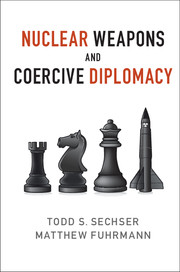Book contents
1 - Nuclear Blackmail in International Politics
from Part I - The Logic of Nuclear Skepticism
Published online by Cambridge University Press: 16 February 2017
Summary
In the early hours of July 16, 1945, in New Mexico's Jornada del Muerto desert, the United States detonated the world's first nuclear device: a single test bomb with the explosive power of more than 18,000 tons of TNT. The shock wave from the explosion was felt over 100 miles away, but its effects reverberated around the world. Over the next several decades, the United States spent trillions of dollars building and maintaining a vast nuclear arsenal. At its peak in the mid-1960s, America's stockpile consisted of more than 30,000 atomic warheads. Seventy years into the nuclear age, it is time to ask: what exactly has the United States gained from its investment in the bomb? What has it been able to do with nuclear weapons that it could not have done without them?
The United States is not the only country interested in the answers to these questions. Nine other countries have built nuclear weapons since 1945 (see Table 1.1). All of these states made tremendous sacrifices in order to acquire atomic weaponry. Zulfikar Ali Bhutto, the former prime minister of Pakistan, famously boasted that his countrymen would “eat grass” in order to produce the Pakistani bomb. Pakistan ultimately built a nuclear arsenal – but only at a tremendous financial cost. The production of China's atomic bomb likewise required a significant readjustment of national priorities. Beijing's official guidelines for building the bomb indicated that all “other projects for our country's reconstruction will have to take second place to the development of nuclear weapons.” More recently, North Korea endured years of crippling economic sanctions and international isolation in order to join the nuclear club. Are the benefits that stem from possessing nuclear weapons sufficient to justify these kinds of sacrifices? What have Pakistan, China, and other nuclear powers gained from privileging nuclear weapons programs at the expense of their economic development and other national priorities?
Scholars and politicians have puzzled over the political effects of nuclear weapons for decades. Yet most thinking about nuclear weapons has been devoted to a single idea: the ability of nuclear weapons to deter aggression.
- Type
- Chapter
- Information
- Nuclear Weapons and Coercive Diplomacy , pp. 3 - 21Publisher: Cambridge University PressPrint publication year: 2017



